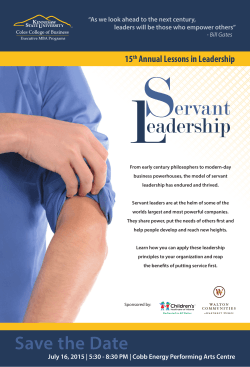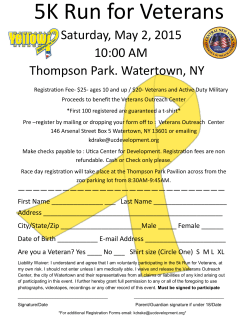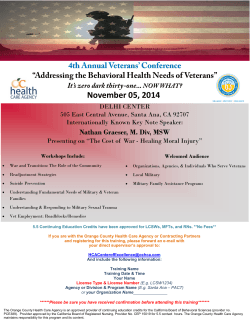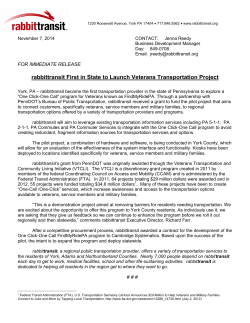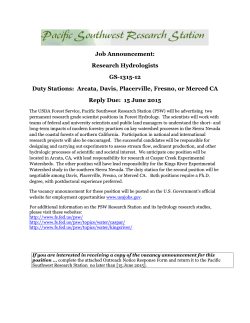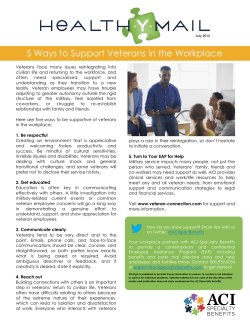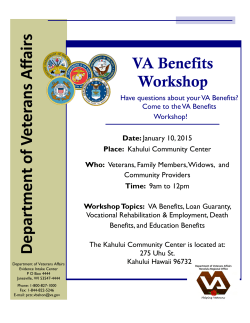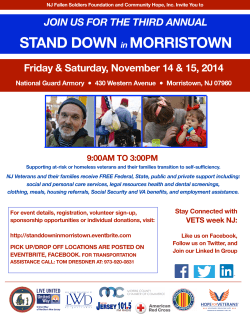
Invited Presentation: The Journey to Servant Leadership
The Journey to Servant Leadership To Serve First VA Psychology Leadership Conference May 23, 2015 Linda W. Belton, FACHE Deputy Director VHA National Center for Organization Development Toolkit Exercise Think of an Historical Figure You Consider a Servant Leader. Why? Now think of someone who has been a servant leader in your life. Why? What characteristics do you think of in a servant leader? VETERANS HEALTH ADMINISTRATION 2 VA’s Transformational Agenda • Transforming models of care • Patient / family centered care • High performing teams • A culture of service • Transforming relationships • Customer satisfaction/ Veteran experience • Civil, engaged workforce • Ensuring the public trust VETERANS HEALTH ADMINISTRATION 3 Transformational Workplace: All Things Connected Patient Centered Care; Customer Service Safe,Timely, Quality Outcomes I CARE Serving the Veteran VeteranCentric Serving the Employee CREW (civility) Systems Redesign Diversity & Inclusion Serving the Organization Employee Engagement Leadership IntegratedEthics Learning Organization Servant Leadership TransformationisCultureChange 4 What is Culture? Taken‐for‐granted values, assumptions and expectations that characterize organizations and their members. How things are really done around here (water cooler conversations) Culture permeates the environment – for better or for worse Culture is the anchor: what doesn’t change when everything around you is changing. Culture change is a process: It takes time It’s built on behavior change Culture change works best in a healthy organization. VETERANS HEALTH ADMINISTRATION 5 A Healthy Organization… Balances Nurtures Success Immediate Tasks Incubator for in Complex & With Building Transformation Chaotic Systems That Organizations Strengthen Over Time Employees Choose To Work VETERANS HEALTH ADMINISTRATION Veterans Choose to Receive Service Connects all Employees Personally to VA Mission VA A Healthy Organization is foundation, not fluff 6 “Ninety percent of what we call ‘management’ consists of making it difficult for people to get things done.” Peter Drucker VETERANS HEALTH ADMINISTRATION 7 Servant Leadership is both a philosophy and a set of practices. Servant Leaders are persons of integrity who lead an organization to success by putting the needs of customers (Veterans), employees and communities first; sharing knowledge and power; and helping people develop and perform to their highest capacity. VETERANS HEALTH ADMINISTRATION Test of a Servant Leader Do those served grow as persons? Do they become healthier, wiser, freer, more autonomous, more likely themselves to become servants? Leaders Servant First, Leader Second VETERANS HEALTH ADMINISTRATION We’re all leaders, all the time. 9 Research Shows… Servant Leadership positively influences: • Collaboration & effectiveness (Parris & Peachey) • Service orientation (Wong & Davey) • Helping / Organizational citizenship behaviors (Erhart) • Perception of fairness (Walumbwa) • Influence of / satisfaction with supervisor (Laub) • Innovation (Jaramillo) • Employee satisfaction & engagement (Cerit) • Communication and trust (Liden) • Supports organizational transformation (Patterson) VETERANS HEALTH ADMINISTRATION 10 Fortune 500 Companies ROI (%) 30 24.5 25 20 17.5 15 10.8 10 5 0 No change in leadership practice VETERANS HEALTH ADMINISTRATION Good to Great leadership Servant Leadership What is Unique in Servant Leadership? Serve Others For Their Own Good Encourage Growth to Reach Potential Concerned About Success of All Stakeholders VETERANS HEALTH ADMINISTRATION Moral Authority Self-Reflection, Humility & No Spotlight 12 WHY SERVANT LEADERSHIP IN VA? Servant Leadership Serves VA’s Transformational Agenda • Personalized, proactive, Veteran-centered service • Civil, engaged workforce • High-performing teams • Customer service • Results- driven • Links to: I CARE, ethics, learning organization, diversity & inclusion, systems redesign, managing change, succession planning, VETERANS HEALTH ADMINISTRATIONpsychological safety 14 VETERANS HEALTH ADMINISTRATION Servant Leadership is Relationship‐Based VETERANS HEALTH ADMINISTRATION Supports Psychological Safety • Employee’s ability to ask questions or bring up team issues without fear of reprisal or negative consequences • Ability to STOP THE LINE! [Deming] • Glitch hunts, not witch hunts! • Learning and innovation are chilled in a fearful organization. More later…. 17 VETERANS HEALTH ADMINISTRATION Implementing Servant Leadership in VA: Challenges to Change • Bureaucratic/ Political Environment • Size • Realities of culture change • Misperceptions VETERANS HEALTH ADMINISTRATION 18 Common Misperceptions: Challenges to Change VETERANS HEALTH ADMINISTRATION 19 Misperception: You can’t practice Servant Leadership in a government agency. Misperception: Servant Leadership isn’t strong leadership. I don’t want to be seen as a pushover. VETERANS HEALTH ADMINISTRATION Servant Leadership: Not for the Fainthearted! • It is not soft • Requires: – Strength of self‐mastery – Strength of action – Strength of relationships • In healthy organizations, power is the capacity generated by relationships. • SL’s operate from courage, persistence, integrity, strong internal compass. VETERANS HEALTH ADMINISTRATION 22 Misperception: The term “servant” is a turn‐off/ offends me. Difference between “service” and “servitude” VETERANS HEALTH ADMINISTRATION Misperception: I can’t embrace SL if my supervisor doesn’t. Don’t wait for the memo! ‐ Don’t underestimate your power to change the workplace. VETERANS HEALTH ADMINISTRATION We’re all Leaders All the Time… Everybody can be great because anybody can serve. You don’t have to have a college degree to serve. You don’t have to make your subject and verb agree to serve. You only need a heart full of grace. A soul generated by love. ‐ Rev. Dr. Martin Luther King, Jr. VETERANS HEALTH ADMINISTRATION 25 “When you’re a hammer, everything looks like a nail.” Servant Leaders aren’t hammers: they’re the whole toolbox. VETERANS HEALTH ADMINISTRATION 26 Orchestrating Servant Leadership in VA Servant Leaderspeak from the top VA ACHE Greenleaf Conf. Singapore CDC Board Representation VETERANS HEALTH ADMINISTRATION 50+ Presentations Organizational Health Newsletter 27 Growing Servant Leadership in VA Servant Leadership in VA Leadership Programs VETERANS HEALTH ADMINISTRATION • Servant leaders get results • Supports a transformational environment • VHA’s developing reputation as a SL org • Now have assessment tool and internal expertise • SL is already out there – a quiet revolution (the org is playing catch‐up with what’s already going on!) • Help new leaders develop new skills for new times Growing Servant Leadership in VA 360 Org Health Web Site http://organizational health.vssc.med.va.go v/Pages/Default.aspx SL 360 SelfAssessment VETERANS HEALTH ADMINISTRATION 180 SL 180 SelfAssessment Ultimate goal: a Culture of Servant Leadership 29 7 Pillars of Servant Leadership 7 Pillars 1. Person of Character 4. Compassionate Collaborator 2. Puts People First 3. Skilled Communicator 7. Leads With Moral Authority 5. Has Foresight 6. Systems Thinker Contact Jaimee Robinson, NCOD for SL 360 / 180 James Sipe & Don Frick (2009) VETERANS HEALTH ADMINISTRATION 30 Sowing the Seeds…. Making it Personal… Connecting to the Mission… VETERANS HEALTH ADMINISTRATION 31 Translating into Practice: Building the Culture • No playbook: only guiding principles • Every employee must translate principles into practice. • What is meaningful to me? • Why is this important? • What will I do differently? • What impact will I have? VETERANS HEALTH ADMINISTRATION 32 Relevance to Psychologists VETERANS HEALTH ADMINISTRATION What Will SL Look Like for You? Non‐Supervisory Offering to help team members Say good morning; ask how someone is Patient/Client “Is there anything you need; I have the time.” Supervisory Communicate honestly / respectfully Staff Give developmental opportunities to staff Share credit for accomplishments Super Listen; act on feedback Welcome feedback, even when it isn’t good news visor Be a coach, not a critic Model SL behaviors VETERANS HEALTH ADMINISTRATION Servant Leadership… …Why You? • You have earned respect by your education, experience and inclination to serve • Impact on patients/clients • Impact on colleagues • Impact on culture • You are systems thinkers – see connections and relationships • Some of you are in positions of authority now – or in future • We’re all leaders, all the time. VETERANS HEALTH ADMINISTRATION Servant Leadership is not a Race: It’s a Journey VETERANS HEALTH ADMINISTRATION Commitment What two things will I commit to doing to grow as a Servant Leader? 1._____________________________________ 2._____________________________________ VETERANS HEALTH ADMINISTRATION Internal Dialog of a Servant Leader Why do I serve? Service is not a byproduct of leadership: it is the whole point. Whom do I serve? How do I define our customers? Our community? How do I serve? ‘Serve’ is a verb! How do others observe me serving? I’m not a servant leader unless others see me as one. VETERANS HEALTH ADMINISTRATION 38 VETERANS HEALTH ADMINISTRATION For more information, please contact VHA National Center for Organization Development (NCOD) Telephone: Email: Website: 40 (513) 247‐4680 VHANCOD@va.gov http://vaww.va.gov/NCOD http://www.va.gov/NCOD
© Copyright 2025
